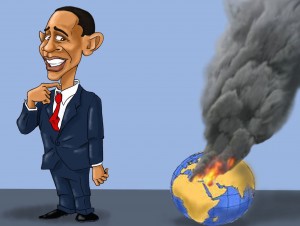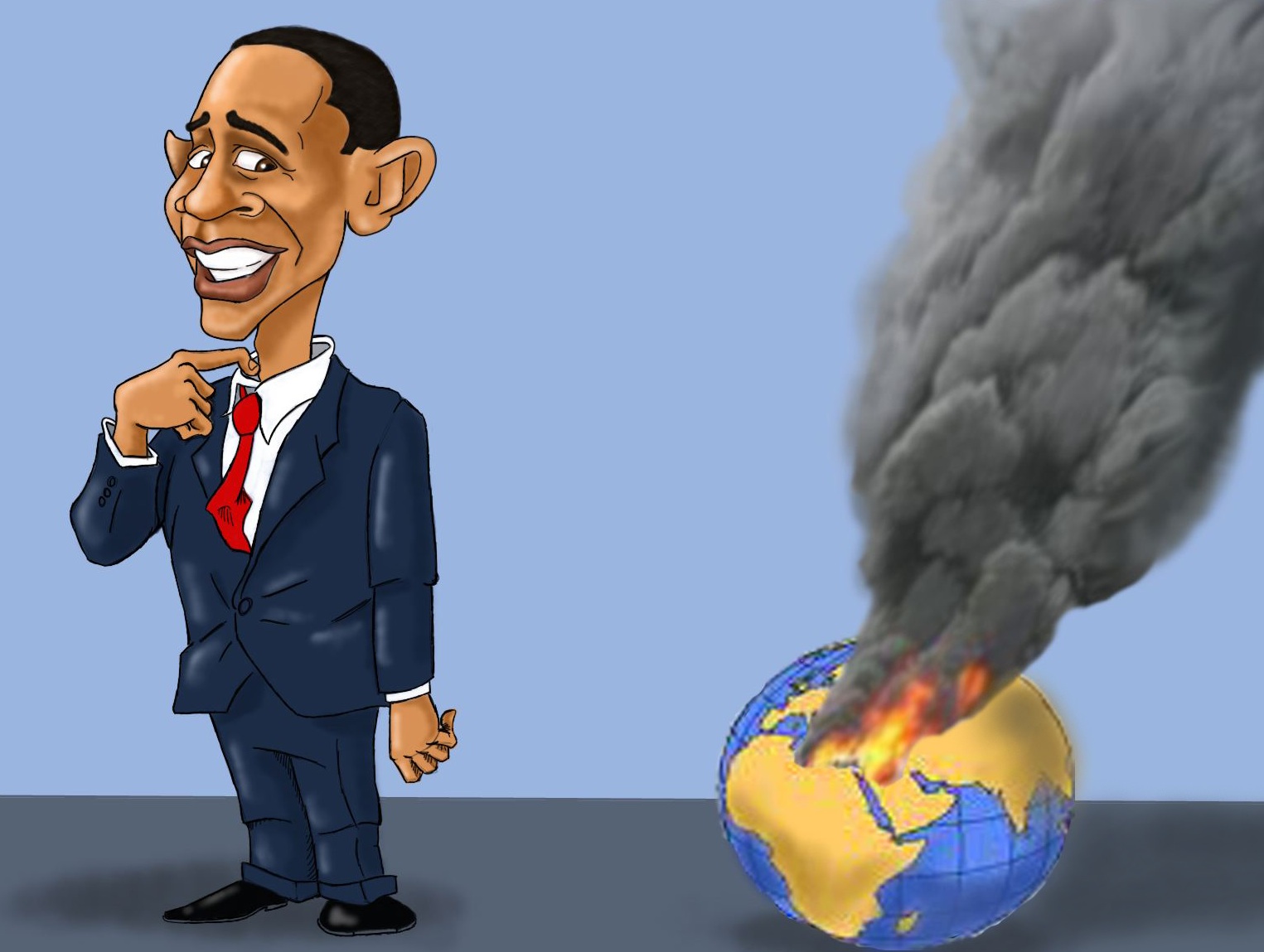The president’s desperation for a foreign-policy legacy is leading toward a bad nuclear deal—and a dangerous one.
By Peggy Noonan • Wall Street Journal
 Barack Obama, six years into his presidency, does not have a foreign-policy legacy—or, rather, he does and it’s bad. He has a visceral and understandable reluctance to extend and overextend U.S. power, but where that power has been absent, violence and instability have filled the void. When he overcomes his reluctance to get involved, he picks the wrong place, such as Libya, where the tyrant we toppled was better than many of those attempting to take his place.
Barack Obama, six years into his presidency, does not have a foreign-policy legacy—or, rather, he does and it’s bad. He has a visceral and understandable reluctance to extend and overextend U.S. power, but where that power has been absent, violence and instability have filled the void. When he overcomes his reluctance to get involved, he picks the wrong place, such as Libya, where the tyrant we toppled was better than many of those attempting to take his place.
Syria, red lines, an exploding Mideast, a Russian president who took the American’s measure and made a move, upsetting a hard-built order that had maintained for a quarter-century since the fall of the Soviet Union—what a mess.
In late February, at a Washington meeting of foreign-policy intellectuals, Henry Kissinger summed up part of the past six years: “Ukraine has lost Crimea; Russia has lost Ukraine; the U.S. has lost Russia; the world has lost stability.”
What Barack Obama needs is a foreign-policy win, and not only for reasons of legacy. He considers himself a serious man, he wants to deal constructively with a pressing, high-stakes international question, and none fits that description better than Iran and nuclear weapons. And so the talks in Lausanne, Switzerland.
Here is the fact. The intention behind a deal—to stop Iran from developing, and in the end using, nuclear weapons—could not be more serious and crucial. The Arab world has entered a war phase that may go for decades. Its special threat is that the struggle is not only an essential one—Sunni vs. Shia, in a fight to the end—but that it engenders and is marked by what British Prime Minister David Cameron has called “the death cult.” Many in the fight have no particular fear of summoning the end of the world.
Once Iran has what used to be called the bomb, there will be a race among nearby nations—Persian Gulf states, Egypt, Saudi Arabia, Turkey—to get their own. As each state builds its arsenal, there will be an increased chance that freelancers, non-states and sub-states will get their hands on parts of it.
The two most boring words in history are “nuclear proliferation.” Jimmy Carter made them so on Oct. 28, 1980, when, in a presidential debate, he announced that his 12-year-old daughter, Amy, had told him that the great issue of the day was the control of nuclear arms. America laughed: So that’s where the hapless one gets his geopolitical insights.
Nuclear proliferation has been a problem for so long that we no longer talk or think about it. But in the current moment in the Mideast, we’re not talking “nuclear proliferation” in the abstract. It’s more like talking about the spread of nuclear weapons among the inmates of an institution for the criminally insane.
Here I digress, but only to get near the heart of the matter.
There are many reasons nuclear weapons have not been used since 1945. One is that the U.S. was not evil and the Soviet Union was not crazy. It was also a triumph of diplomacy, of imperfect but ultimately sound strategic thinking, that kept the unthinkable from happening. (There was luck involved, too.)
Great credit is due also to a book. It is what made the future use of nuclear weapons unthinkable.
“Then a tremendous flash of light cut across the sky. Mr. Tanimoto has a distinct recollection that it travelled from east to west, from the city toward the hills. It seemed a sheet of sun.” That is from the first pages of “Hiroshima,” by the journalist John Hersey, published in a full issue of the New Yorker magazine almost exactly a year after the Aug. 6, 1945, dropping of the atomic bomb on that city. Soon after, the article was published as a book. Both caused a sensation, painting for the first time, in plain, subdued style, the facts of what really happened when a nuclear weapon was used on a human population. He wrote of people vaporized, radiation sickness and poisoned water. “The fluid from their melted eyes had run down their cheeks.” A man reached for a woman and the skin came off her hand like a glove. In a city of 245,000 almost 100,000 were immediately killed, and another 100,000 left desperately sick and wounded.
“Hiroshima” did a huge and historic thing. It not only told the world what happened when a nuclear weapon was used, it single-handedly put a powerful moral taboo on its future use. After “Hiroshima,” which sold millions of copies, no one wanted it to happen again.
But now it is almost 70 years since that book. It isn’t required reading anymore. In that time nuclear weapons have only become more powerful. But the world hasn’t really thought about nuclear war since 1989, as if the threat ended when the Soviet Union did.
What do the wild, young, apocalyptic warriors of the Mideast know of the old taboo?
To Iran, and the negotiations:
What is needed is a deal that keeps Iran from developing nuclear weapons, period. A bad deal will be worse and more dangerous than no deal. A bad deal will—perhaps—slow the deadly project, not end it.
None of the reporting out of Lausanne has suggested that a helpful agreement would emerge. Tuesday’s deadline for production of a basic framework was missed; on Thursday, a framework, the contents of which were not revealed, was announced. But President Obama is not known as a good negotiator. He and his White House have given the impression that they want a deal too much—they need the win. It isn’t good when you let the people on the other side know how much you need it.
Meanwhile there were interesting journalistic reflections from left and right. The headline on Ari Shavit’s April 2 piece in Haaretz, the liberal Israeli newspaper, called the talks a “march of folly.” Past sanctions on Iran cratered their economy and forced them to the table, but now, from a position of weakness, he wrote, they are “overcoming the West” with “cunning” and “resolve.” Signs point to a bad deal in June and a bad deal will be dangerous.
K.T. McFarland, writing online for Fox News this week, opposed the talks from a different angle. The “neoconservatives who believe the only way to stop Iran’s bomb is to bomb Iran” are wrong, she said, as is President Obama when he says the choice is a deal or war. “Our policy . . . should not be Obama-style capitulation or Bush-style war,” but increasing political pressure through increased economic sanctions. More than 70% of Iranians are under age 30, Ms. McFarland noted. “How long will they tolerate being ruled by a handful of 80-year-old mullahs who have pushed their economy into free fall?”
Everything about the talks has had the look of a bad deal, one that will not stop Iran’s nuclear ambitions but will allow that nation, in Mr. Shavit’s words, to “cast a giant shadow on world peace.”
Mr. Obama should have walked when Tuesday’s deadline failed to hold. Absent an ultimate deal, something good can always happen down the road. With a bad final deal nothing good will happen, and bad things will surely follow.
In the end he should toughen the sanctions and wait out the mullahs. No one in America would be angry. Most would think “Wow, if he walked, it must have been a terrible deal—give him credit for trying!” Everyone else would be relieved.
That would enhance his foreign-policy legacy. That would be a win.
